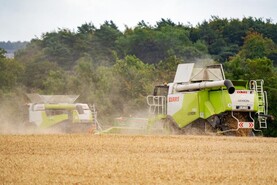The workers’ union Unite has written to the First and Deputy First Ministers calling for mass testing of employees across the meat processing sector in NI.
It follows on from a number of reported cases of coronavirus in meat factories in NI, including the Foyle plant in Omagh, Linden Foods and Moy Park. On Tuesday, Unite confirmed that a Moy Park employee Luciana Viviana da Silva had died from the virus, although there is no suggestion that the company was at fault.
We can confirm that a recent unannounced inspection was carried out at a Moy Park meat processing plant
Across the major meat processing sites in NI, measures have been taken to help ensure social distancing and worker safety, in line with Public Health Agency (PHA) advice.
Responding to concerns raised by Unite, the Health and Safety Executive for NI (HSENI) said that it is currently undertaking unannounced inspections across businesses, with priority given to food processing.
“We can confirm that a recent unannounced inspection was carried out at a Moy Park meat processing plant. A few minor issues were found but the overall compliance with the PHA COVID-19 guidance was found to be of a high standard. This approach will continue,” confirmed a HSENI spokesperson.
They went on to advise that if someone with COVID-19 has been in a workplace, the areas where they worked should be cleaned in line with PHA guidance.
However, when it comes to testing key workers, it is currently only for those who are showing early symptoms or have household members who are symptomatic of the disease, with three drive-through test centres in NI:
Odyssey Car park, Belfast.City of Derry Rugby Club.Craigavon MOT centre.Unite has warned that if there isn’t mass testing of workers at processing sites, there is a risk that the virus will spread as it has done in care homes. It has also suggested that, where necessary, factories with a cluster of cases should be forced to temporarily close.
Read more
10 clusters of COVID-19 in meat plants
Wool markets fleeced by coronavirus
The workers’ union Unite has written to the First and Deputy First Ministers calling for mass testing of employees across the meat processing sector in NI.
It follows on from a number of reported cases of coronavirus in meat factories in NI, including the Foyle plant in Omagh, Linden Foods and Moy Park. On Tuesday, Unite confirmed that a Moy Park employee Luciana Viviana da Silva had died from the virus, although there is no suggestion that the company was at fault.
We can confirm that a recent unannounced inspection was carried out at a Moy Park meat processing plant
Across the major meat processing sites in NI, measures have been taken to help ensure social distancing and worker safety, in line with Public Health Agency (PHA) advice.
Responding to concerns raised by Unite, the Health and Safety Executive for NI (HSENI) said that it is currently undertaking unannounced inspections across businesses, with priority given to food processing.
“We can confirm that a recent unannounced inspection was carried out at a Moy Park meat processing plant. A few minor issues were found but the overall compliance with the PHA COVID-19 guidance was found to be of a high standard. This approach will continue,” confirmed a HSENI spokesperson.
They went on to advise that if someone with COVID-19 has been in a workplace, the areas where they worked should be cleaned in line with PHA guidance.
However, when it comes to testing key workers, it is currently only for those who are showing early symptoms or have household members who are symptomatic of the disease, with three drive-through test centres in NI:
Odyssey Car park, Belfast.City of Derry Rugby Club.Craigavon MOT centre.Unite has warned that if there isn’t mass testing of workers at processing sites, there is a risk that the virus will spread as it has done in care homes. It has also suggested that, where necessary, factories with a cluster of cases should be forced to temporarily close.
Read more
10 clusters of COVID-19 in meat plants
Wool markets fleeced by coronavirus






 This is a subscriber-only article
This is a subscriber-only article










SHARING OPTIONS: